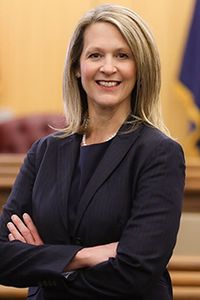Sallie Mundy
2016 - Present
2027
8
Sallie Mundy (Republican Party) is a judge on the Pennsylvania Supreme Court. She assumed office on July 21, 2016. Her current term ends on December 31, 2027.
Gov. Tom Wolf (D) nominated Mundy to the state supreme court on June 13, 2016, to fill a vacancy caused by the resignation of Justice Michael Eakin (R).[1] Mundy was confirmed by the Pennsylvania State Senate on June 27, 2016.[2] She won election to a full ten-year term on November 7, 2017.[3] To read more about judicial selection in Pennsylvania, click here.
In 2020, Ballotpedia published Ballotpedia Courts: State Partisanship, a study examining the partisan affiliation of all state supreme court justices in the country. As part of this study, we assigned each justice a Confidence Score describing our confidence in the degree of partisanship exhibited by the justices' past partisan behavior, before they joined the court.[4] Mundy received a confidence score of Mild Republican.[5] Click here to read more about this study.
Before joining the state supreme court, Mundy was a judge on the Pennsylvania Superior Court from 2010 to 2016. She previously worked as a volunteer public defender in Tioga County, Pennsylvania, and with various law firms from 1988 to 2009.[6]
Biography
Mundy was born on June 29, 1962, in Elmira, New York.[7] She received a bachelor's degree from Washington and Jefferson College in 1984 and a law degree from the University of Pittsburgh in 1987.[6]
Mundy began her legal career as a law clerk for Judge Robert M. Kemp in Tioga County, Pennsylvania from 1987 to 1988. From 1988 to 2009, Mundy worked at several law firms and law offices in State College, Bala Cynwyd, and Philadelphia, Pennsylvania. From 2008 to 2009, she was a volunteer public defender in Tioga County, Pennsylvania. In 2009, Mundy was elected to the Pennsylvania Superior Court, where she remained until Gov. Tom Wolf (D) appointed her to the Pennsylvania Supreme Court in 2016. She won election to a full, ten-year term on the supreme court in 2017.[6]
Elections
Pennsylvania Supreme Court (2016-present)
Gov. Tom Wolf (D) nominated Mundy to the Pennsylvania Supreme Court on June 13, 2016, to fill a vacancy caused by the resignation of Justice Michael Eakin (R).[1] Mundy was confirmed by the Pennsylvania State Senate on June 27, 2016.[2] She assumed office on July 21, 2016.[8] The Philadelphia Inquirer's Chris Brennan wrote, "In naming Mundy, Wolf ... departed from a long-established tradition in Pennsylvania politics of governors having interim court nominees promise not to run for full terms in the next election."[9] Mundy sought and won election to a full term in 2017.
2017
Incumbent Sallie Mundy (R) defeated Dwayne D. Woodruff (D) in the general election for Mundy's seat on the Pennsylvania Supreme Court.[10]
| General Election for Pennsylvania Supreme Court (Mundy Seat), 2017 | ||||
|---|---|---|---|---|
| Party | Candidate | Vote % | Votes | |
| Republican | 52.28% | 1,090,485 | ||
| Democratic | Dwayne D. Woodruff | 47.72% | 995,540 | |
| Total Votes | 2,086,025 | |||
| Source: Pennsylvania Department of State, "2017 Municipal Election Unofficial Returns," accessed December 21, 2017 | ||||
Pennsylvania Superior Court (2010-2016)
Mundy won election to the Pennsylvania Superior Court on November 3, 2009, and assumed office in 2010.[11]
2009
Mundy won election to one of the four open seats on the Pennsylvania Superior Court on November 3, 2009.[11]
| Candidate | Incumbent | Party | Primary % | Election % | |
|---|---|---|---|---|---|
| Judith Olson |
No | Republican | 37.1% | 15.1% | |
| Sallie Mundy |
No | Republican | 33.5% | 13.7% | |
| Paula Ott |
No | Republican | 12.7% | ||
| Anne Lazarus |
No | Democratic | 11.5% | ||
| Robert Colville | No | Democratic | 11.4% | ||
| Templeton Smith | No | Republican | 29.3% | 11.4% | |
| Kevin McCarthy | No | Democratic | 11.3% | ||
| Teresa Sarmina | No | Democratic | 10.9% | ||
| Marakay Rogers | No | Libertarian | 2% |
Analysis
Ballotpedia Courts: State Partisanship (2020)
Last updated: June 15, 2020
In 2020, Ballotpedia published Ballotpedia Courts: State Partisanship, a study examining the partisan affiliation of all state supreme court justices in the country as of June 15, 2020.
The study presented Confidence Scores that represented our confidence in each justice's degree of partisan affiliation. This was not a measure of where a justice fell on an ideological spectrum, but rather a measure of how much confidence we had that a justice was or had been affiliated with a political party. The scores were based on seven factors, including but not limited to party registration.[12]
The five resulting categories of Confidence Scores were:
- Strong Democrat
- Mild Democrat
- Indeterminate[13]
- Mild Republican
- Strong Republican
This justice's Confidence Score, as well as the factors contributing to that score, is presented below. The information below was current as of June 2020.
Sallie
Mundy
Pennsylvania

- Partisan Confidence Score:
Mild Republican - Judicial Selection Method:
Elected - Key Factors:
- Was a registered Republican as of 2020
- Received donations from Republican-affiliated individuals or organizations
- Appointed by a Democratic governor
Partisan Profile
Details:
Mundy was appointed by Gov. Tom Wolfe (D) to fill a vacancy on the Pennsylvania Supreme Court. The Pennsylvania Republican Party donated $463,636 to her campaign for retention. She was endorsed by the National Rifle Association.
State supreme court judicial selection in Pennsylvania
- See also: Judicial selection in Pennsylvania
The seven justices of the Pennsylvania Supreme Court are selected in partisan elections.[14]
Justices serve 10-year terms, after which they must run in yes-no retention elections if they wish to remain on the court. A separate part of the ballot is designated for these elections, and justices' names appear without respect to party affiliation.[14][15] To learn more about these elections, visit the Pennsylvania judicial elections page.
Qualifications
To serve on the supreme court, a justice must:
- have state residence for at least one year;
- be a member of the state bar; and
- be under the age of 75.[14][16]
Chief justice
The Pennsylvania Supreme Court chooses its chief justice by seniority; the title is held by the longest-serving justice on the court.[14][17]
Vacancies
In the event of a midterm vacancy, the governor appoints a successor who must be approved by a two-thirds vote of the Pennsylvania Senate. Interim justices stand for election at the next municipal election occurring more than 10 months after the vacancy occurred.[14]
By tradition, appointed interim judges of the supreme court, superior court, or court of appeals do not go on to run for permanent seats. In other words, the governor appoints these judges with the expectation that the judge will only fill the interim vacancy.[14]
The map below highlights how vacancies are filled in state supreme courts across the country.
See also
External links
Footnotes
- ↑ 1.0 1.1 Pittsburgh Post-Gazette, "Wolf nominates Superior Court judge to fill vacancy on Pa. Supreme Court," June 13, 2016
- ↑ 2.0 2.1 The Philadelphia Inquirer, "Porngate justice's replacement approved," June 27, 2016
- ↑ Politics PA, "Mundy Wins Election to Full Term as State Supreme Court Justice," Nov. 7, 2017
- ↑ We calculated confidence scores by collecting several data points such as party registration, donations, and previous political campaigns.
- ↑ The five possible confidence scores were: Strong Democrat, Mild Democrat, Indeterminate, Mild Republican, and Strong Republican.
- ↑ 6.0 6.1 6.2 The Unified Judicial System of Pennsylvania, "Justice Sallie Updyke Mundy," accessed Aug. 5, 2021
- ↑ Pennsylvania Bar Association, "Personal Data Questionnaire," accessed Aug. 5, 2021
- ↑ The Unified Judicial System of Pennsylvania, "Justice Mundy takes oath of office," July 21, 2016
- ↑ The Philadelphia Inquirer, "Did politics figure in Gov. Wolf's pick for high court?" June 16, 2016
- ↑ Pennsylvania Department of State, "2017 Municipal Election Information," accessed December 21, 2017
- ↑ 11.0 11.1 OurCampaigns, "PA Superior Court Judge," accessed Aug. 5, 2021
- ↑ The seven factors were party registration, donations made to partisan candidates, donations made to political parties, donations received from political parties or bodies with clear political affiliation, participation in political campaigns, the partisanship of the body responsible for appointing the justice, and state trifecta status when the justice joined the court.
- ↑ An Indeterminate score indicates that there is either not enough information about the justice’s partisan affiliations or that our research found conflicting partisan affiliations.
- ↑ 14.0 14.1 14.2 14.3 14.4 14.5 American Judicature Society, "Methods of Judicial Selection: Pennsylvania," archived October 3, 2014
- ↑ The Unified Judicial System of Pennsylvania, "In Re: Nomination Papers of Marakay Rogers, Christina Valente and Carl J. Romanelli," November 7, 2006
- ↑ 2018 Pennsylvania Consolidated Statutes, "Title 42, Chapter 33, Section 3351," accessed August 25, 2020
- ↑ The Pennsylvania Code, "Chapter 7. Assignment of Judges," accessed September 3, 2014
Federal courts:
Third Circuit Court of Appeals • U.S. District Court: Eastern District of Pennsylvania, Middle District of Pennsylvania, Western District of Pennsylvania • U.S. Bankruptcy Court: Eastern District of Pennsylvania, Middle District of Pennsylvania, Western District of Pennsylvania
State courts:
Supreme Court of Pennsylvania • Pennsylvania Superior Court • Pennsylvania Commonwealth Court • Pennsylvania Court of Common Pleas • Pennsylvania Magisterial Districts
State resources:
Courts in Pennsylvania • Pennsylvania judicial elections • Judicial selection in Pennsylvania






